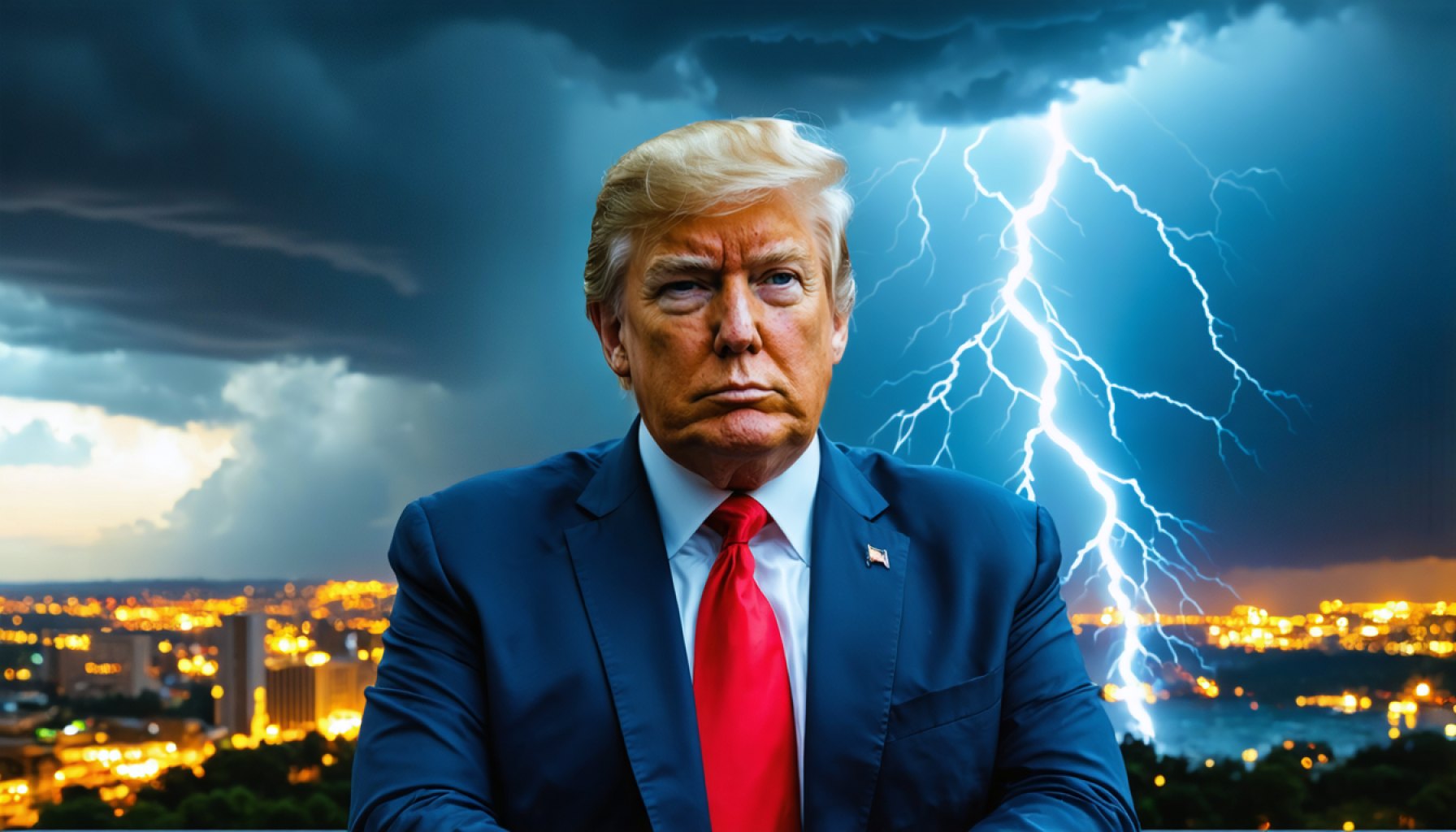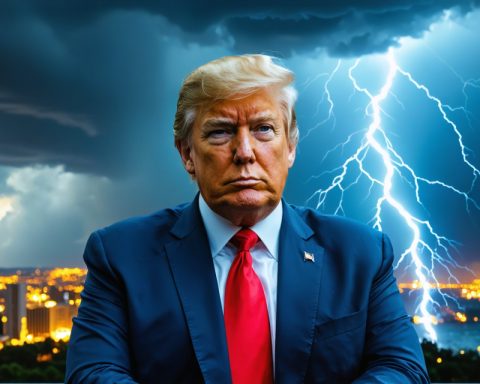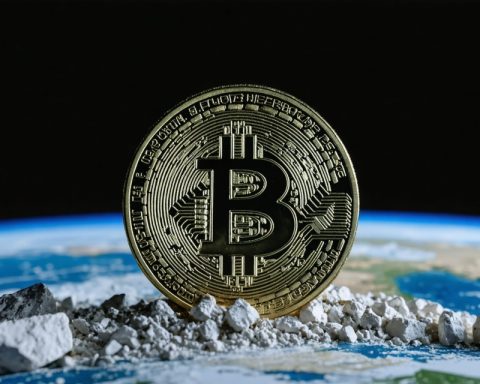- The US political climate intensifies as President Trump criticizes Federal Reserve Chairman Jerome Powell, raising concerns about the Fed’s autonomy.
- US stock markets face volatility, with the Dow dropping nearly 1,000 points amid rising Treasury yields and a trade conflict with China.
- China’s firm response to US tariffs emphasizes global economic interdependence and escalating trade tensions.
- The S&P 500 and Nasdaq indices show significant declines, indicating broader economic and sector-specific challenges.
- Trump’s calls for lower interest rates clash with the Fed’s measured approach, heightening recession fears.
- Increased borrowing costs and potential consumer financial strain loom as Treasury yields rise.
- China’s influence in international finance grows through its US debt holdings, affecting global economic stability.
- Investors must adapt to the shifting political and economic landscapes, acknowledging the interplay between market stability and political actions.
The political theater in Washington has taken a dramatic twist, setting markets on edge as President Donald Trump embarks on a high-stakes feud with Jerome Powell, the Chairman of the Federal Reserve. Trump’s robust criticism, akin to thunder rolling across markets, questions the Fed’s autonomy amid an already delicate economic landscape. This verbal assault arrived like an unwelcome autumn storm, pushing the US stock markets into a tempestuous sea of uncertainty. Investors are left clutching their portfolios as the Dow plummeted by nearly 1,000 points, mirroring the sharp wind that disrupts calm waters.
While Trump’s vocal tirades strike headlines, it’s the undercurrents of rising US Treasury yields and an escalating trade standoff with China that keep economists and analysts spellbound. The trade disputes, which once simmered under the surface, now erupt, with China responding firmly to US tariff actions. In a bold stance, Beijing sends a crystal-clear message—cross us economically, and there will be repercussions.
China’s rhetoric underscores a crucial reality: the world’s interconnected economies are trembling under the weight of this economic tug-of-war. As American tariffs ripple through global trade routes, long-held alliances shake, and markets grow ever more jittery.
Beneath the unfolding drama, the numbers paint a stark picture. The S&P 500 has dipped 16% below its peak levels from February, inching ominously towards what market experts term as “bear territory.” The tech-laden Nasdaq, weighed down by struggles from giants like Tesla and Nvidia, swims against the tide, reflecting broader challenges in the sector.
Trump’s latest salvo on Truth Social, prodding Powell to cut rates amidst fears of an economic slowdown, further adds to market anxieties. The insistence on what could be seen as haste from the President clashes sharply with the Fed’s more measured approach, rooted in cautious optimism to tamp down inflation.
Yet, the specter of a recession looms large. Rising Treasury yields and a depreciating dollar starkly highlight the economic frictions. With borrowing costs climbing, everyday expenditures like mortgages and loans could soon see hikes, ushering in financial strain for consumers and businesses alike.
Beyond America’s shores, the ripples of this American storm are felt far and wide. China, the second-largest holder of US government debt, wields its bond holdings as an economic lever. Such moves shake the very foundation of international finance, further unsettling the US dollar’s standing in the global currency hierarchy.
The takeaway is unequivocal: as political motives cloud economic landscapes, markets brace for choppier waters. Investors, once buoyed by stable outlooks, must now navigate these unpredictable seas, reevaluating strategies and preparing for potential upheavals.
The robust challenges underscore a pivotal revelation—economic stability is not merely a function of monetary policy but also hinges on the broader political environment. As tensions rise and uncertainties mount, global markets glance warily towards America, their collective breaths held, anticipating the next act in this unfolding drama.
President Trump’s Clash with the Federal Reserve: Market Fears Amplified
Market Trends and Economic Insights
The landscape of global finance is currently shaken by a significant geopolitical and economic confrontation. Recent tensions between President Donald Trump and Federal Reserve Chairman Jerome Powell have had immediate and pronounced effects on financial markets and broader economic stability. Here are some additional facts and insights:
Rising Treasury Yields and Economic Impact
– Interest Rate Dynamics: The clash over rate cuts highlights a contentious debate. While President Trump advocates for lower rates to spur growth amidst fears of a downturn, the Fed maintains a cautious stance to control inflation.
– Economic Implications of High Yields: Rising treasury yields often signal investor apprehension and can lead to increased borrowing costs for businesses and consumers. This trend could slow investment and spending, amplifying recessionary fears.
Trade Tensions with China: A Global Ripple
– Tariff Impact: The ongoing trade war with China compounds market volatility. Tariffs make goods more expensive, shrink international trade, and pressure companies to reassess supply chains and profit margins.
– Global Interconnections: As a retaliatory measure, China’s stance and economic strategies, like leveraging U.S. debt holdings, illustrate the delicate balance of international economic relationships, potentially disrupting global stability.
Real-World Use Cases and Market Predictions
– Investment Strategy Adjustments: Investors should consider diversifying portfolios and exploring safer assets, such as gold or certain real estate investments, to hedge against volatility.
– Industry-Specific Impact: Sectors reliant on exports, like technology and agriculture, may face pressures that necessitate strategic pivots or cost-cutting.
– Long-term Forecasts: If tensions persist, there may be a shift towards manufacturing localization and reduced dependency on volatile international supply chains, particularly in industries like automotive and tech.
Reviews & Comparisons: Fed vs. Trump
– Approaches to Economic Management: The Federal Reserve’s methodical and data-driven approach often contrasts with President Trump’s more aggressive and politically motivated strategies. Analysts generally favor the Fed’s prudence, though not without critique, for its long-term stability goals.
Controversies and Critiques
– Monetary Policy Autonomy: The President’s vocal criticisms raise concerns about the Fed’s independence, crucial for maintaining unbiased and effective economic policymaking.
– Public Perception: Political interventions in monetary policy can undermine public confidence in financial institutions, leading to increased market instability.
Actionable Recommendations
– Investor Advisory: For individual investors, maintaining a balanced portfolio with both growth and defensive stocks is critical in uncertain times.
– Consumer Advice: With potential interest rate fluctuations, locking in fixed-rate loans, such as mortgages, sooner rather than later might be prudent.
Quick Tips for Navigating Market Volatility
1. Stay Informed: Regularly track credible financial news and expert analyses to stay ahead of potential impacts on personal finances.
2. Asset Diversification: Consider including non-traditional assets like commodities (gold, silver) into your portfolio for added security.
3. Emergency Fund: Establish a robust emergency fund to cover unforeseen expenses during economic downturns.
In conclusion, while political influences on economic policy can create short-term market turbulence, informed strategies and careful planning can help weather financial storms. For more financial advice and updates, visit [Federal Reserve’s Website](https://www.federalreserve.gov) and [U.S. Treasury Department](https://www.treasury.gov).








